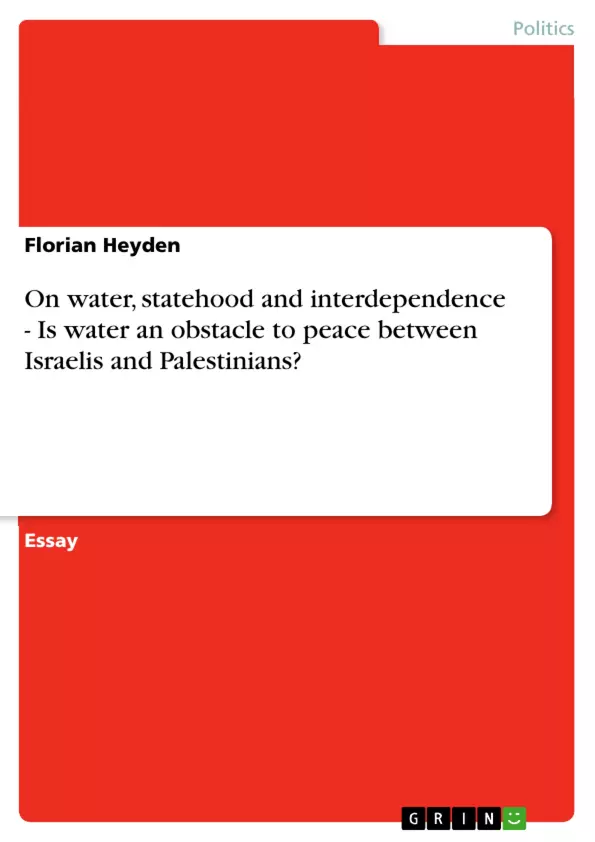This paper looks at the role played by water in the context of the Palestinian Territories. In the course of the ongoing dispute between Palestinians and Israelis, negotiations over a political settlement focus at large on five main issues: refugees, Israeli settlers, defining the borders, the final status of Jerusalem, and water. While the first four issues have taken a relatively prominent role in the public debate, the fifth one has often been sidelined in favour of more emotional and ′obvious′ topics. This is however not to say that water would not play a crucial role in finding a peaceful political solution to the ongoing dispute.
In fact, as we will show, the regional water scarcity and related problems pose outwardly intractable problems going hand in hand with ideological and geographical disputes in a wider matrix of conflicting riparians of the Jordan River basin. We will further show that water has the ability to act both as an aggravator to conflict and as a solution to hostility and mistrust and can in fact be part for a first step towards a solution to the entire regional conflict.
However, while water clearly is a regional issue, we will, in order to keep this work concise, concentrate on the geographical region of Palestine, illustrating the interrelationship between ecology and security in the context of the ongoing conflict.
Inhaltsverzeichnis (Table of Contents)
- Introduction
- I. On the regional importance of water
- II. On how water contributes to conflict
- III. On how water can contribute to peace
- Conclusion
Zielsetzung und Themenschwerpunkte (Objectives and Key Themes)
This paper examines the role of water in the context of the Palestinian Territories, highlighting its significance in the ongoing conflict between Israelis and Palestinians. The paper explores the regional water scarcity and its contribution to existing tensions, while also investigating the potential for water to serve as a catalyst for peace and reconciliation. The objective is to illuminate the complex relationship between water resources, conflict, and potential solutions in this region.
- The regional importance of water in the Palestinian Territories
- The role of water as a catalyst for conflict
- The potential for water to contribute to peace
- The interplay between ecology and security in the context of the Israeli-Palestinian conflict
- Water scarcity and its impact on the region's agricultural and industrial sectors
Zusammenfassung der Kapitel (Chapter Summaries)
- Introduction: This section introduces the main theme of the paper, focusing on the role of water in the Israeli-Palestinian conflict. It establishes the context of ongoing negotiations and highlights the relative neglect of the water issue in public discourse.
- I. On the regional importance of water: This chapter explores the regional importance of water in the Palestinian Territories, discussing the scarcity of freshwater resources and the impact of droughts and overexploitation. It also highlights the vulnerability of water supply to both seasonal and long-term fluctuations.
- II. On how water contributes to conflict: This chapter analyzes the ways in which water scarcity and competition for resources contribute to conflict in the region. It examines the pressure on water supply from a growing population and the historical and ongoing disputes over water resources.
Schlüsselwörter (Keywords)
The primary keywords and focus topics of this text include: water scarcity, Israeli-Palestinian conflict, regional importance of water, water as a catalyst for conflict, potential for water to contribute to peace, ecology and security, water resources management, water scarcity and its impact on the region's agricultural and industrial sectors, population growth and its impact on water resources, and the interplay between water and geopolitics.
Frequently Asked Questions
Why is water a central issue in the Israeli-Palestinian conflict?
Water is one of the five "final status" issues in negotiations due to regional scarcity, shared aquifers, and its vital importance for agriculture, industry, and daily survival.
Can water be a catalyst for peace?
Yes, because water management requires technical cooperation, it can serve as a starting point for building trust and establishing functional interdependence between the parties.
What are the main causes of water scarcity in the region?
Key factors include limited freshwater resources, frequent droughts, overexploitation of groundwater, and rapid population growth.
How does water scarcity affect the Palestinian economy?
Insufficient water supply severely restricts agricultural productivity and industrial development, hindering economic growth and state-building efforts.
What is the relationship between ecology and security in this context?
Environmental degradation and resource competition can lead to social unrest and political instability, making ecological management a national security priority.
- Citar trabajo
- M.A. Florian Heyden (Autor), 2006, On water, statehood and interdependence - Is water an obstacle to peace between Israelis and Palestinians?, Múnich, GRIN Verlag, https://www.grin.com/document/58281



